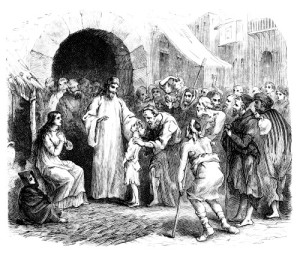Today’s Readings: Matthew 27:46
About three in the afternoon Jesus cried out in a loud voice, “Eli, Eli,[a] lema sabachthani?” (which means “My God, my God, why have you forsaken me?”).
How can I know God listens to my prayers? How can I know God meets me where I am? How can I have the assurance God can reach the depths of my sins when I know the things I’ve committed against Him and others? How can He ever forgive the things I’ve done?
We can look back at this verse in Matthew and understand the depths of God’s love for us. Jesus hung on the cross for about six hours on that day before the Sabbath. Usually it took longer for men to die under the cruel execution methods of crucifixion, but Jesus didn’t die at men’s hands. He gave up His life voluntarily. Remember He was God. He was eternal. Yes, Jesus was fully man, but He is also fully God.
This verse tells us, though, that the God-Man, Jesus, separated Himself from the triune Godhead long enough to become sin for us. He felt the full weight of the world’s sins upon His shoulders and felt the complete and utter aloneness that comes from the sin that separates us from a holy God. Jesus, by taking all the sin of all the world descended to the very deepest, darkest, depths of hell to pay the price for our sins. He knows the penalty, because He paid it. He went there for us.
How deep is His love? He plunged Himself deeper than anyone can go into the pit of hell so we don’t have to. He did that to liberate us. Three days later, He burst forth from the tomb that held Him proving that sin and hell and the grave had no hold on Him. He tasted death and overcame it. He overcame death for all of us. He overcame sin for all of us. He overcame hell for all of us.
God loved us enough to become man and separate Himself not only from His triune relationship, but to take on the sin of the world and enter the depths of hell for us. He cried from the cross, “My God, my God, why have you forsaken me?”, as He assumed the sins of the world for us. He took them with Him to the place of eternal separation from God and endured that place of eternal punishment for three of our earthly days, thousands of years for an eternal timeless God. For the psalmist tells us a thousand years is as a day and a day as a thousand years to God, to whom time has no meaning in eternity.
 So when we pray, we have the assurance God knows the depths of our depravity. He went there during those three days after the cross. He descended into the very depths of hell and knows how dark and deep sin can go. But it wasn’t too deep for Him to get Himself or us out of it. He overcame. We have the assurance nothing we do is so bad He can’t help us recover from it. He can bring us through it, if we accept His gift of love and follow Him through the paths He sets before us. Just follow Him.
So when we pray, we have the assurance God knows the depths of our depravity. He went there during those three days after the cross. He descended into the very depths of hell and knows how dark and deep sin can go. But it wasn’t too deep for Him to get Himself or us out of it. He overcame. We have the assurance nothing we do is so bad He can’t help us recover from it. He can bring us through it, if we accept His gift of love and follow Him through the paths He sets before us. Just follow Him.
Join me next time, won’t you?
Richard





